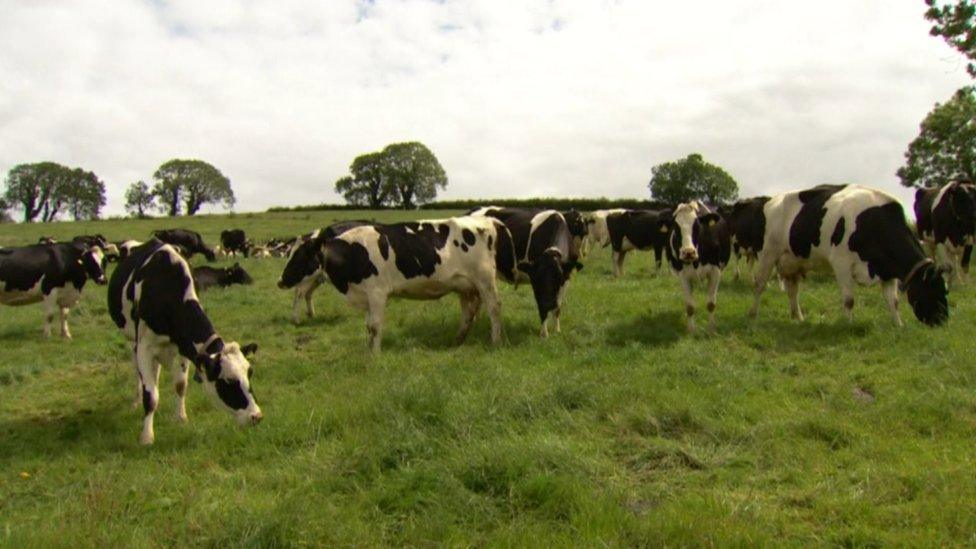Post-Brexit trade warning for Scottish farmers
- Published

The EU agriculture commissioner has warned Scottish farmers to expect trade barriers after Brexit.
During a visit to Edinburgh, Phil Hogan said "things are going to be very different" after the UK leaves the EU.
He stressed that it will not be possible to keep existing free trade arrangements while leaving the European single market and customs union.
UK ministers say a free trade deal is possible, highlighting the importance of UK-EU trade for both sides.
And they said there would be "opportunities" for farmers post-Brexit, with the government pledging to listen to their concerns to "create a farm scheme that works".
The Scottish government said any free trade agreement that is not on the same basis as single market membership would be "a disaster".
The UK is due to leave the EU in March 2019, although it will stick with most existing trading arrangements during a transition period - currently set to last until 31 December 2020. Talks are ongoing about what the UK's trade with the EU will look like after that.
'Narrow options'
Mr Hogan - a former Irish government minister who has been the EU commissioner for agriculture and rural development since 2014 - told BBC Scotland that the red lines drawn by the UK side in the negotiations left few options open.
He said: "The United Kingdom has put up a lot of barriers to finding solutions. They want to opt out of the single market, out of the customs union, with no reference to regulatory alignment - it narrows the options in relation to what is possible to reach agreement.
"But hopefully we'll be able see over the coming months some flexibility on the UK side in order to achieve a better outcome than perhaps people might imagine.
"The UK has given a lot of ground in the last year, considering what they said at the beginning of these negotiations, and the EU position is very clear. But if you say you want a particular type of agreement, but say at the same say you don't want to be in a customs union or a single market or have regulatory alignment, of course it narrows the options into a Canadian-type free trade agreement."

Mr Hogan met with representatives of the Scottish and UK governments in Edinburgh
Speaking following a conference in Edinburgh also attended by UK and Scottish government ministers, Mr Hogan said that "things are going to be very different" after Brexit.
He said: "There are going to be barriers, there are going to be inconveniences for people who are supplying goods and services in both directions, and these are the logistical issues that people are starting to concentrate on now, because they realise that Brexit is going to happen."
Mr Hogan highlighted agricultural products like beef and lamb as among those which could face tariffs in future.
He said: "This is going to be part of negotiations for the new free trade agreement, and it's going to be a number of years before we agree all of this.
"And if we don't make an agreement, it's going to go to World Trade Organisation tariff rates, which could be 23% or 24% on certain agricultural products."
Frictionless borders
Scotland Office minister Ian Duncan insisted that "progress has been made" in negotiations, saying the UK was seeking a "frictionless" trading arrangement with the EU.
He said: "What we're looking for is no tariffs and no non-tariff barriers. We don't want troubles at the customs lines, that's not going to help us.
"We are the single most important consumer for EU goods, and they are our most important consumer. So anything that does us harm, harms them.
"Frictionless borders are what we're looking for - an arrangement that makes sense to traders on both sides of that line and recognising that there will be divergences as we go forward, we should be able to see some form of an alignment which keeps us in lock-step."

Lord Duncan said Brexit would provide opportunities for the UK to "strike off in a new direction", also stressing that farming will be "totally devolved" in Scotland.
He said: "You speak to any farmer and they will tell you of some of their troubles with the bureaucracy, some of their issues around the computer handling of their support schemes and so on.
"There are opportunities now. It's not going to be top-down, it's not going to be us telling farmers what it's going to be - it's going to be listening to farmers and saying, what didn't work for you before, and how do we create a farm scheme that works?"
Single market membership
Scottish External Affairs Secretary Fiona Hyslop was also at the conference, and underlined the Scottish government's backing for continued single market membership.
The MSP said Brexit talks were at a "critical stage", with no agreement over the post-Brexit fate of devolved powers - including some over agriculture - which are currently exercised from Brussels.
She said: "Single market membership is not just about ability to trade, it's about access to labour - if you look at our farming sector, being able to access labour is really important.
"Maintaining good quality standards is vital to our agricultural sector - we don't want any deals that the UK would want to have with any other part of the world to have chlorinated chicken, for example, or hormone-injected beef.
"So, therefore, the best way to maintain standards, have access to labour and ensure delivery of our goods and services to markets in Europe, we need single market membership to continue.
"There has been some movement to date in recognition of the importance of that argument, but a free trade agreement that is not on the same basis as single market membership would be a disaster. Everybody knows that the EU will not give preferential treatment to the UK over single market members."